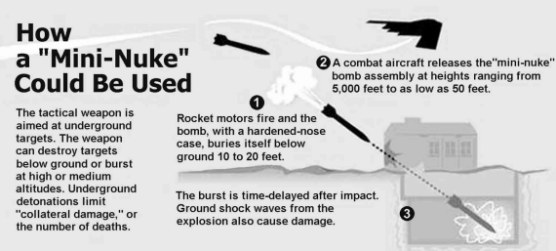
US Air Force Test-launches New ICBM
(February 5, 2020) — Russian Deputy FM Sergey Ryabkov expressed “great concern” over the US decision to deploy W76-2 nuclear warheads of submarines, saying concerns were also fueled by “arguments previously voiced by the American side about the possible use of such a device.”
The Pentagon confirmed the deployment of the low-yield, submarine-launched ballistic missile warhead on Tuesday. Officials said it was needed to “deter” Russia.
Despite the nominal appeal to deterrence, US officials have often presented the low-yield nukes as more usable. This has fueled substantial concern that the US would introduce nukes with a lower threshold, and would make the use of nuclear weapons more common, and less unthinkable than they’ve been for decades.
This is just one aspect of the US nuclear policy that is concerning. The Air Force also announced Wednesday that they carried out a test-launch of the Minuteman III, fitted with a test re-entry vehicle, into the Pacific Ocean.
The test is part of an effort to modernize US nuclear-capable ICBMs. The test is part of a multi-billion dollar Pentagon program to develop advancements to the nuclear warhead being used by the ICBM. The test launch, of course, used an unarmed warhead.
Again, while the US is presenting this test as routine military testing, it is impossible not to point out that the US routinely rails against other nations conducting any tests of this sort.

Russia Says Alarmed by US Deployment of Low-yield Nuclear Missiles
MOSCOW (Reuters) — Russia is alarmed by the US Navy’s decision to deploy low-yield nuclear missiles on submarines since they heighten the risk of a limited nuclear war, a Russian official said on Wednesday.
Deputy Foreign Minister Sergei Ryabkov said the deployment of the W76-2 warhead in the name of strengthening deterrence had caused Russia great concern over US nuclear strategy, Russian news agencies reported.
The US Defense Department said on Tuesday the Navy had fielded a low-yield, submarine-launched ballistic missile warhead, something the Pentagon says is needed to deter adversaries like Russia.
Ryabkov said Russian rearmament and “promising models of military equipment” meant the US warheads were not a direct threat to Russian security but were concerning nevertheless.
“The appearance on strategic carriers of low-power warheads means arguments previously voiced by the American side about the possible use of such a device are now being realized in metal form, as products.
“This reflects the fact that the United States is actually lowering the nuclear threshold and that they are conceding the possibility of them waging a limited nuclear war and winning this war. This is extremely alarming.”
Russia’s misgivings over US nuclear policy have grown since Washington pulled out of a landmark strategic arms accord, the Intermediate-Range Nuclear Forces Treaty (INF), in August, citing violations by Russia that Moscow denies.
It means the New START accord, signed in 2010, is the last major nuclear arms control treaty between the world’s two biggest nuclear powers. It limits the number of long-range nuclear warheads they can deploy.
“Meaningful Dialogue”
Low-yield nuclear weapons, while still devastating, have a strength of less than 20 kilotons. The atomic bomb dropped on Hiroshima, in August 1945, had about the same explosive power.
The argument for these weapons is that larger nuclear bombs are so catastrophic that they would never be used, meaning they are not an effective deterrent. With less destructive power, the low-yield option would potentially be more likely to be used, serving as an effective deterrent, US military officials have said.
On Wednesday, President Vladimir Putin held a ceremony at the Kremlin to welcome 23 new foreign ambassadors to Moscow, including Washington’s new envoy, John Sullivan.
Putin said peace and security on the planet largely depended on the stability and predictability of relations between Russia and the United States based on equality, mutual respect of sovereignty and non-interference in each other’s affairs.
“We are ready for meaningful dialogue with the American side, including in the sphere of arms control and strategic stability,” Putin said.
Additional reporting by Idrees Ali in Washington; editing by Philippa Fletcher
Posted in accordance with Title 17, Section 107, US Code, for noncommercial, educational purposes